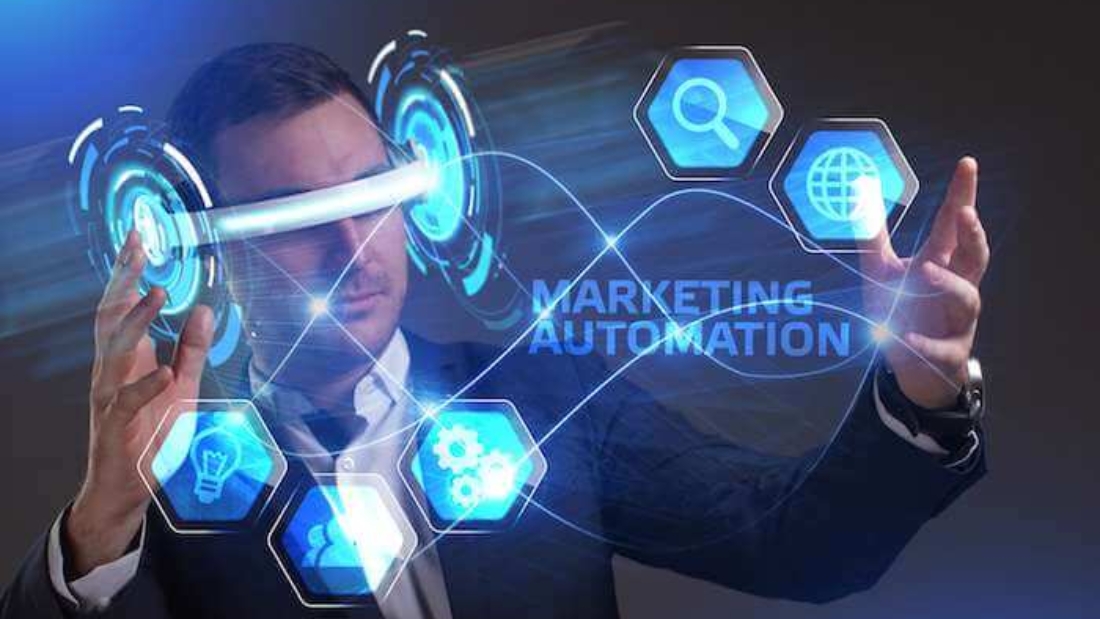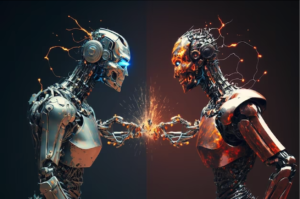Digital marketing, a cornerstone of modern business strategies, has witnessed a transformative evolution. From the rudimentary email marketing campaigns of its early days, it’s now powered by advanced AI algorithms and machine learning tech. This shift towards AI in Marketing Automation isn’t just a trend; it’s a paradigm change in how businesses connect with their audience.
With AI automation software now at their disposal, marketing teams are better equipped to make data-driven decisions and offer a more personalized experience based on customer behavior.
In this extensive guide, we’ll dive deep into the world of AI-powered marketing automation, from understanding the role of machine learning in automating repetitive tasks to exploring how Natural Language Processing (NLP) enhances AI marketing tools, and how AI automation strategies are revolutionizing customer service and sales funnels. We’ll cover all of the bases.
By the end, you’ll have a new understanding and appreciation for how AI marketing automation software is reshaping the digital landscape, allowing marketers to save time, improve efficiency, and create more impactful marketing campaigns that are proven to generate more revenue.
Let’s get into it.
Note: For more info on FREE AI SOFTWARE, read our article 23 Free AI Tools for Sales and Marketing: A 2024 Guide.
What is AI Marketing Automation?
AI Marketing Automation signifies a transformative departure from traditional digital marketing methods. It harnesses the power of artificial intelligence to enhance marketing campaigns, making them more precise and personalized. Gone are the days of labor-intensive manual tasks; with AI, marketers can automate and optimize their outreach efforts, ensuring more impactful and efficient campaigns.
Difference Between Traditional And AI-Driven Automation
Traditional marketing automation, like email drip campaigns or scheduled social media posts, laid the foundation for automated outreach. However, the introduction of AI capabilities, such as predictive analytics and natural language processing (NLP), has elevated the game. Unlike the conventional “one-size-fits-all” approach, AI-driven marketing automation tailors its strategies based on individual user behaviors, ensuring a more personalized and effective outreach.
Precision With Personalization
This new era allows for precision at scale – something unheard of before now. Imagine being able not only to know who clicked through an ad but also why they did so. This level of detail gives marketers unprecedented insights into customer behavior leading them down a path toward creating highly tailored content that speaks directly to each person’s needs. Machine learning takes personalization up a notch by learning from each interaction to continuously refine its approach.
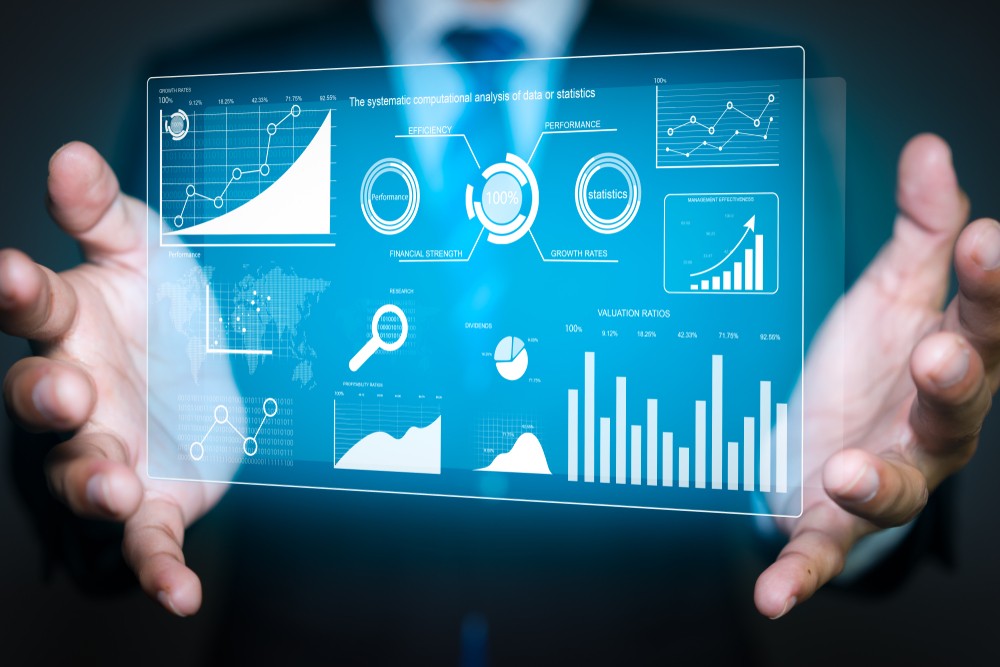
The Role of Data
Data is the lifeblood of AI marketing automation. The system thrives on vast amounts of information; the more data it receives, the more adept it becomes at predicting customer preferences and behaviors. But it’s essential to understand that this isn’t just about collecting emails or tracking clicks. It’s about harnessing the power of data to understand, predict, and cater to the ever-evolving needs of the customer.
Key Thought:
AI is revolutionizing marketing automation, letting us get personal and precise without the grind of manual tasks. By harnessing machine learning and data analytics, we can anticipate customer behavior from patterns in vast amounts of data. So now, instead of a generic approach, we’re able to tailor our content to meet individual needs – all this while constantly evolving.
The Evolutionary Leap: From Manual Strategies To AI Integration
In the early days of digital marketing, teams heavily relied on manual processes. Techniques like A/B testing and trial-and-error methods were the norm, often leading to inconsistent results and consuming vast amounts of time. However, as the landscape evolved, so did the marketing tools available.
Around 2006, a significant shift occurred. Companies began to see the potential benefits of marketing automation tools. These tools could automate tasks such as sending emails, posting social media updates, and analyzing vast amounts of customer data.
No longer burdened by these repetitive tasks, marketing companies could redirect their employees focus. They now had the bandwidth to concentrate on strategy development, creative endeavors, and leveraging AI algorithms to gain insights into customer behavior.
As AI technology advanced, so did its integration into the marketing world, leading to the rise of AI marketing automation. This AI-powered marketing automation not only streamlined processes but also offered a more personalized experience to users, based on predictive analytics and natural language processing (NLP).
A New Dawn: The Emergence Of AI In Digital Marketing
The dawn of AI in digital marketing heralded a pivotal transition. We witnessed a move from mere rule-based automation tools to sophisticated AI systems. These AI systems, powered by machine learning and deep learning, could help marketers identify patterns within vast amounts of customer data, making predictions and offering personalized experiences based on those insights.
This shift wasn’t just about automating repetitive tasks; it was about leveraging AI algorithms to improve customer engagement and marketing efforts.
Today, technology giants like Google and Microsoft are at the forefront of this revolution. They’re investing billions into crafting advanced machine learning algorithms. “…Google may have spent upwards of $200 billion on AI investment over the past decade,” said Scott Kessler, global sector lead for technology media and telecommunications at Third Bridge.
Why Is This Important?
AI-powered marketing automation tools streamline activities that once demanded extensive labor and time, such as analyzing customer data or optimizing marketing campaigns.
But the benefits of AI go beyond mere efficiency. It empowers marketers to make informed decisions swiftly, leading to more strategic and impactful marketing efforts.
The result? Enhanced strategies, improved customer experience, and a notable boost in ROI. Recognizing this potential, businesses are increasingly channeling their investments into AI-driven marketing tools and solutions.
In an article by Grid Dynamics, “According to an estimation made by PwC, the implementation of AI-based solutions at mass scale can contribute as much as $15.7 trillion to the world economy by 2030, leading to a 14% growth of global GDP.”
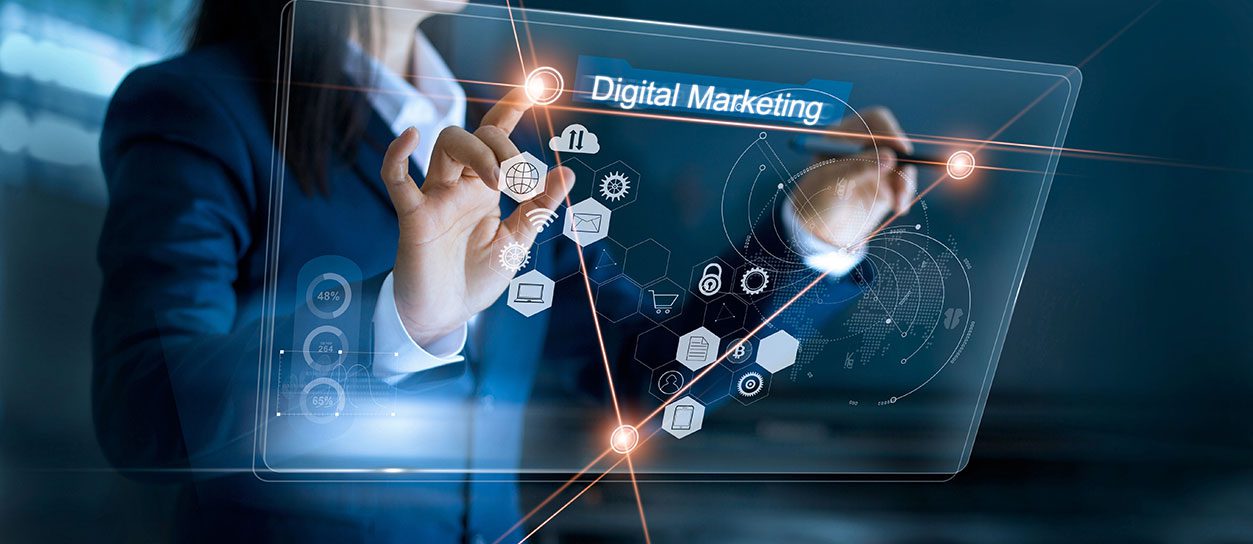
The Rise of AI in Digital Marketing
The journey from traditional marketing strategies to digital solutions has been significant, but the introduction of Artificial Intelligence (AI) has been nothing short of revolutionary. As noted by the Forbes Tech Council, the advent of AI has transitioned us from mere automation to tools capable of intelligent decision-making.
The catalyst for this transformation is the vast amounts of data at our disposal. Modern marketers are inundated with a deluge of customer data sourced from various channels, including social media interactions, online transactions, and browsing patterns. Navigating this sea of information manually is not just challenging; it’s virtually unfeasible. So, how do businesses harness this data to create impactful marketing campaigns?
Note: For more info on FREE AI SOFTWARE, read our article 23 Free AI Tools for Sales and Marketing: A 2024 Guide.
Enter AI-Powered Automation
Artificial Intelligence, with its advanced algorithms and machine learning capabilities, swiftly sifts through vast amounts of customer data, pinpointing patterns and trends that might elude human analysis. These insights aren’t just statistical data points; they’re invaluable tools for crafting effective marketing campaigns.
At its core, AI offers a deep dive into consumer behavior. It deciphers preferences, online activity patterns, buying habits, and more, equipping marketers with the information they need for precision-targeted advertising campaigns. As IBM aptly puts it, intelligent data analysis paves the way for an enhanced customer experience, ensuring that marketing efforts resonate more deeply and effectively with the target audience.
Salesforce’s research underscores the tangible benefits of this shift. Businesses that have embraced AI-driven marketing strategies report a 63% surge in customer engagement rates and a notable 48% reduction in marketing costs. These figures highlight the transformative potential of integrating artificial intelligence into digital marketing operations
Key Thought:
AI has flipped the digital marketing world on its head. It lets marketers sort through mountains of customer data, spotting patterns that might otherwise slip past us. This helps shape effective strategies and targeted ad campaigns. By automating tasks like email personalization or behavioral tracking, AI saves time and cuts costs – a true game changer in the realm of marketing.
Benefits of AI in Marketing Automation
The digital marketing landscape has undergone rapid transformations, with Artificial Intelligence (AI) emerging as a pivotal force. Integrating AI into marketing automation offers businesses a plethora of advantages, setting them apart in a competitive market.
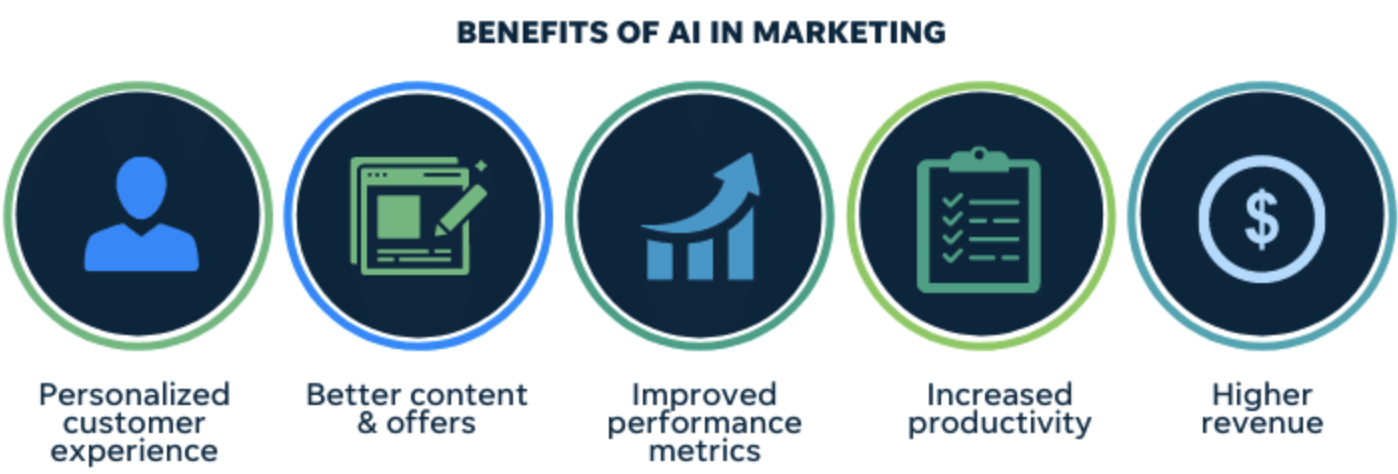
Elevated Customer Engagement and Satisfaction
The age-old saying, “A satisfied customer is the best business strategy,” remains relevant in today’s digital age. AI-driven tools, equipped with predictive analytics, enable marketers to engage customers precisely when they’re most receptive. By anticipating customer needs or identifying upselling opportunities, AI enhances engagement and satisfaction levels.
Increased Efficiency and Reduced Manual Tasks
Incorporating AI into your marketing strategy can drastically reduce manual tasks. As a marketer, you might spend countless hours sorting through data or creating personalized marketing content for different audience segments. But with AI-powered tools, these tasks are simplified as they can automatically segment audiences based on their behavior or preferences, saving you time and effort.
Boosted ROI and Conversion Rates
Besides boosting efficiency and improving engagement, another key benefit of using AI in marketing automation is its potential to enhance return on investment (ROI). Through techniques like machine learning, predictive analytics helps forecast consumer buying behaviors which allows businesses to optimize their campaigns accordingly hence achieving better conversion rates.
A study from Accenture showed that companies implementing AI reported almost twice the increase in their ROI.
Scalability and Adaptability in Marketing Campaigns
The final major benefit of AI is its scalability. Traditional marketing methods can be resource-intensive to scale up, but with AI, it’s a different story. You’re not just scaling your efforts; you’re also adapting them based on real-time insights from the data.
AI-powered automation tools adapt as they learn more about customer behaviors over time thus making sure that your campaigns remain effective even when consumer preferences change.
Key Thought:
AI transforms marketing automation by cutting down manual tasks, boosting customer engagement and satisfaction, and increasing ROI and conversion rates while offering scalability. With AI-powered tools you can easily segment audiences, predict customer needs for better engagement, forecast buying behaviors to optimize campaigns, and adapt your efforts based on real-time insights.
Key Areas of AI Application in Marketing Automation
The integration of artificial intelligence (AI) into marketing automation has brought a revolution to the digital landscape. Let’s explore some key areas where AI shines brightest.
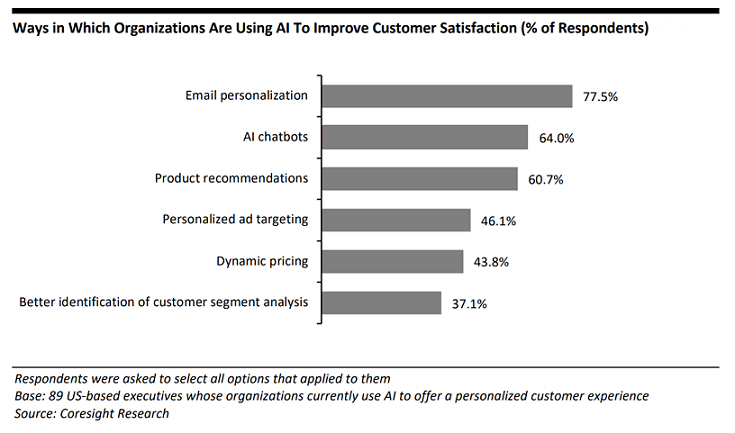
Customer Segmentation and Targeting
In the modern digital landscape, data is invaluable. However, the true power lies in deriving actionable insights from this data. AI excels in sifting through extensive datasets, pinpointing patterns, and correlations that might be elusive to manual scrutiny.
This prowess enables marketers to finely segment their audience, crafting messages tailored to individual behaviors and preferences, ensuring a bespoke outreach.
Predictive Analytics for Potential Customers Targeting
The adage “knowledge is power” evolves to “prediction is profit” in the context of AI. Predictive analytics, fortified by AI, provides foresight by evaluating current trends juxtaposed with historical data. This foresight equips businesses to devise strategies that are not just reactive but proactive, ensuring they remain ahead of the curve.
Content Creation and Curation
No longer do we need poets penning ad copies. Today’s technology enables algorithms like ChatGPT-3 & ChatGPT-4 models by OpenAI to create engaging and personalized content.
The same AI also helps curate existing content by recommending what will appeal most to each individual user, thereby boosting engagement.
Chatbots and Customer Service
Advanced AI such as Siri and Alexa are becoming increasingly intelligent, and able to respond to basic customer service queries without any difficulty. They can handle basic customer service queries around the clock without breaking a sweat.
Gartner’s research suggests that the future of chatbots will be one with greater intelligence and capability.
Note: For more on AI ChatBots read our article Best AI Chatbots and AI Sales Assistants of 2024: Our Top Picks.
Challenges of Implementing AI in Marketing Automation
AI has revolutionized the marketing automation sphere, yet there are difficulties that accompany it like any other technology. From data privacy concerns to potential biases in algorithms, let’s tackle some of these challenges.
Data Privacy and Security Concerns
The crux of AI’s power lies in its ability to analyze vast volumes of customer data. However, this strength also introduces heightened risks for data breaches and misuse. Recent reports, such as those from CSO Online, highlight that even major corporations aren’t immune to cyberattacks.
As we venture deeper into the AI-driven landscape, it’s imperative to bolster security measures and uphold consumer rights, striking a delicate balance between innovation and privacy.
Potential Biases in Algorithms
AI systems are only as good as the data they’re trained on. If this data contains biases, the AI can perpetuate or even amplify these biases, leading to skewed results and potentially unfair or discriminatory outcomes. Ensuring that the data used to train AI systems is representative and unbiased is crucial.
Complexity and Cost of Implementation
While AI offers numerous benefits, implementing it isn’t always straightforward. It requires significant investment in terms of time, money, and expertise. Small businesses, in particular, might find the initial costs of integrating AI into their marketing strategies prohibitive.
Over-reliance on Automation
While automation can streamline many processes, over-relying on it can lead to a lack of human touch in marketing campaigns. When using AI content creation software it’s essential to find the right balance between automation and human intervention to ensure that the marketing remains genuine and relatable.
Keeping Up with Rapid Technological Advancements
The field of AI is evolving at a breakneck pace. For businesses, this means constantly staying updated with the latest developments, tools, and best practices. This can be both time-consuming and challenging, especially for those without a dedicated team to monitor these changes.
That’s why we provide up-to-date and concise information in our articles, so you can get the resources you need and get to work.
The Importance Of Human Oversight In AI-Driven Campaigns
No matter how advanced AI becomes, human oversight is essential. TechCrunch highlighted a case where Microsoft halted a project due to insufficient human supervision.
This underscores the importance of humans as decision-makers despite the allure of automated campaigns.
Navigating the AI Implementation Maze
The challenges don’t stop at data security, human oversight, or bias prevention. Companies often face obstacles while integrating AI into their existing marketing automation systems. Gartner points out that without careful planning and expertise, integration can become a messy affair.
We need comprehensive strategies to tackle these issues head-on for the successful implementation of AI in our marketing efforts. This shows where human intelligence is still superior to artificial in
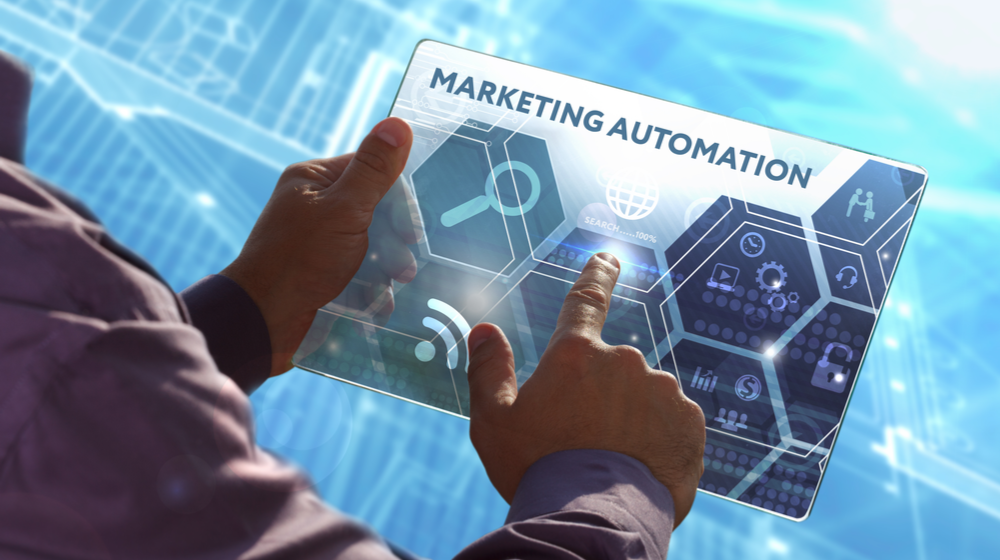
How to Use AI in Your Marketing Automation Strategy
Harnessing the capabilities of artificial intelligence (AI) in marketing automation can seem daunting, but the rewards are substantial. The true potential of AI lies in its ability to sift through vast datasets, discern patterns, and make accurate predictions. So, how can businesses effectively integrate AI into their marketing strategies? Let’s explore.
Leveraging Predictive Analytics
Predictive analytics is an essential part of any successful AI-powered marketing strategy. By using predictive analytics tools, you can anticipate customer behavior based on their past actions. This will help tailor your messages and offer more personalized experiences.
You’re not just predicting the weather here; you’re forecasting consumer trends that let your business get ahead with precision-targeted campaigns.
Note: For more on Predictive AI read our article Generative AI vs Predictive AI: A Beginners Guide.
Personalization with AI-Driven Content Creation
Achieving the right level of personalization can be challenging. Enter AI. It offers automation in content creation without compromising the human touch that customers value.
Automation software like Writesonic utilizes advanced language algorithms, empowering marketers to craft optimized email subject lines or compelling social media ad copy that genuinely resonates.
Sophisticated Customer Segmentation
The days of generic ad blasts are behind us. Today’s consumers demand relevance and personalized interactions from brands. Understanding the nuances within your audience is crucial.
Delve into behaviors like purchase history or browsing patterns using automation platforms like Segment. Such tools help segment customers effectively, ensuring that targeted messaging hits its mark.
Chatbots for Improved Customer Service
The era of monotonous, scripted customer service is over. Modern AI-powered chatbots offer interactions that mimic human conversations, capable of answering queries, resolving issues, and even suggesting products, all in real time.
Key Thought:
Master AI in your marketing strategy by leveraging predictive analytics to anticipate customer behavior, crafting personalized content with tools like Writesonic, and segmenting customers for targeted messaging. Don’t forget the power of AI chatbots – they offer round-the-clock help while maintaining a human touch.
Examples of Successful AI-Powered Marketing Automation Campaigns
Digging into the practical side, let’s check out some companies that have used AI to revamp their marketing automation efforts. They’ve achieved impressive results and learned a thing or two in the process.
Nike: Predictive Analytics for Customer Engagement
Nike has always been at the forefront of integrating technology into its marketing strategies. Their mobile app doesn’t just serve as a shopping platform; it’s a personalized fitness and shopping assistant. Using AI algorithms, Nike analyzes user behavior, workout routines, and purchase history. This data-driven approach allows them to offer tailored product recommendations and workout plans, creating a more personalized user experience. Such initiatives have led to increased user engagement and sales.
Netflix: Data-Driven Content Curation
Netflix has transformed how we consume content. One of its secrets to keeping viewers hooked is its recommendation engine powered by AI. By analyzing viewing patterns, search queries, and even pause and rewind patterns, Netflix curates a personalized list of shows and movies for each user.
This AI-driven approach ensures that users always have something they’d love to watch, reducing churn and increasing watch time – giving ‘binge-watching’ a whole new meaning. Netflix attributes 75% of its viewership to these smart suggestions.
Sephora: Chatbots Enhancing Customer Service Experience
Sephora, the cosmetics giant, has been a pioneer in blending technology with beauty. Their chatbot, known as Sephora Virtual Artist, doesn’t just answer queries. It uses augmented reality to allow users to virtually try on different makeup products. By analyzing user preferences, skin tone, and facial features, the AI recommends products that would best suit the user. This immersive experience has led to higher customer satisfaction and increased sales.
Coca-Cola: Predictive Analysis for Trend Forecasting
Coca-Cola’s marketing strategies have always been iconic. In the digital age, they’ve embraced AI to stay ahead. By analyzing social media trends, online conversations, and even emoji usage, Coca-Cola’s AI-driven predictive analysis tools forecast emerging beverage trends. This data-driven approach has allowed them to launch new products that resonate with current consumer preferences, ensuring they remain a market leader.
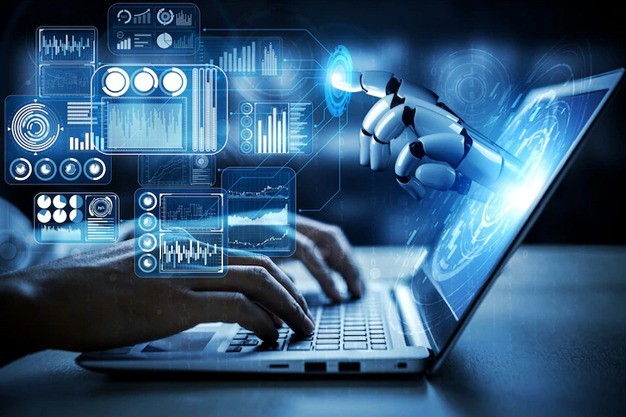
Future Trends in Artificial Intelligence and Marketing Automation
The intersection of marketing automation and artificial intelligence is a dynamic space, brimming with potential. As we look ahead, several trends are emerging that promise to reshape the landscape of digital marketing. Here’s a glimpse into the future:
Hyper-Personalization at Scale:
With AI’s ability to analyze vast amounts of data, the future will see an even greater level of personalization. Brands will be able to tailor and recommend content, offers, and interactions to individual preferences, behaviors, and real-time contexts, all at a scale previously unimaginable.
Voice Search and Smart Assistants:
As devices like Alexa, Siri, and Google Assistant become more integrated into daily life, optimizing for voice search will become crucial. Brands will need to adapt their content and strategies to cater to this growing segment.
AI-Powered Predictive Analysis:
Beyond current predictive analytics, AI will offer deeper insights into customer journeys, allowing marketers to anticipate needs, preferences, and potential churn, adjusting strategies proactively.
Augmented Reality (AR) and Virtual Reality (VR) in Marketing:
Leveraging AI, brands will create more immersive experiences for users, blending the digital and physical worlds. This will revolutionize sectors like retail, real estate, and entertainment.
Ethical AI and Transparent Algorithms:
As consumers become more aware of data privacy and the workings of AI, there will be a push towards more transparent and ethical AI practices. Brands will need to ensure their AI tools are unbiased and explainable.
Real-time Marketing Adjustments:
AI will enable marketing campaigns to adjust in real time based on immediate feedback loops, ensuring optimal performance and resource allocation.
Integration of AI across All Marketing Channels:
From email marketing to social media campaigns, AI will be seamlessly integrated, ensuring a consistent and personalized customer experience across all touchpoints.
Enhanced Visual Recognition:
AI-powered visual recognition will allow brands to gain insights from images and videos on social media, understanding consumer behavior and preferences at a deeper level.
Automated Content Creation:
Beyond just ad copies, AI will assist in creating diverse content types, from blog posts to video scripts, ensuring consistency and relevance.
Quantum Computing: The Game Changer
A leap from classical computing, quantum computing can process vast amounts of data at unprecedented speeds. This opens doors for marketers to make more precise decisions faster than ever before.
This means you could run complex simulations or model scenarios that previously would have taken an eternity. Quantum computers’ ability to crunch big numbers could be a game-changer in predictive analytics, allowing marketers to forecast consumer behavior with uncanny accuracy.
The Rise of Neural Networks
Neural networks, modeled after the human brain’s own network of neurons, represent another trend shaping the AI landscape. These advanced algorithms learn patterns and generate insights from huge volumes of data — just like we do.
Predictive customer segmentation or content personalization? It’s no longer wishful thinking but a reality thanks to neural networks. By tapping into this technology, brands can offer personalized experiences based on individual user behaviors and preferences – all without lifting a finger.
Conversational AI: Chatbots Get Smarter
We’ve all interacted with chatbots – those handy helpers that pop up when we’re browsing online stores or seeking help on websites. AI has been progressing rapidly, enabling these chatbots to become increasingly intelligent and lifelike.
Thanks to conversational AI, future chatbots will be able to understand context better, carry on meaningful dialogues, and even predict customer needs before they voice them. For marketers looking for increased engagement and superior customer service – the bot revolution couldn’t have come at a better time.
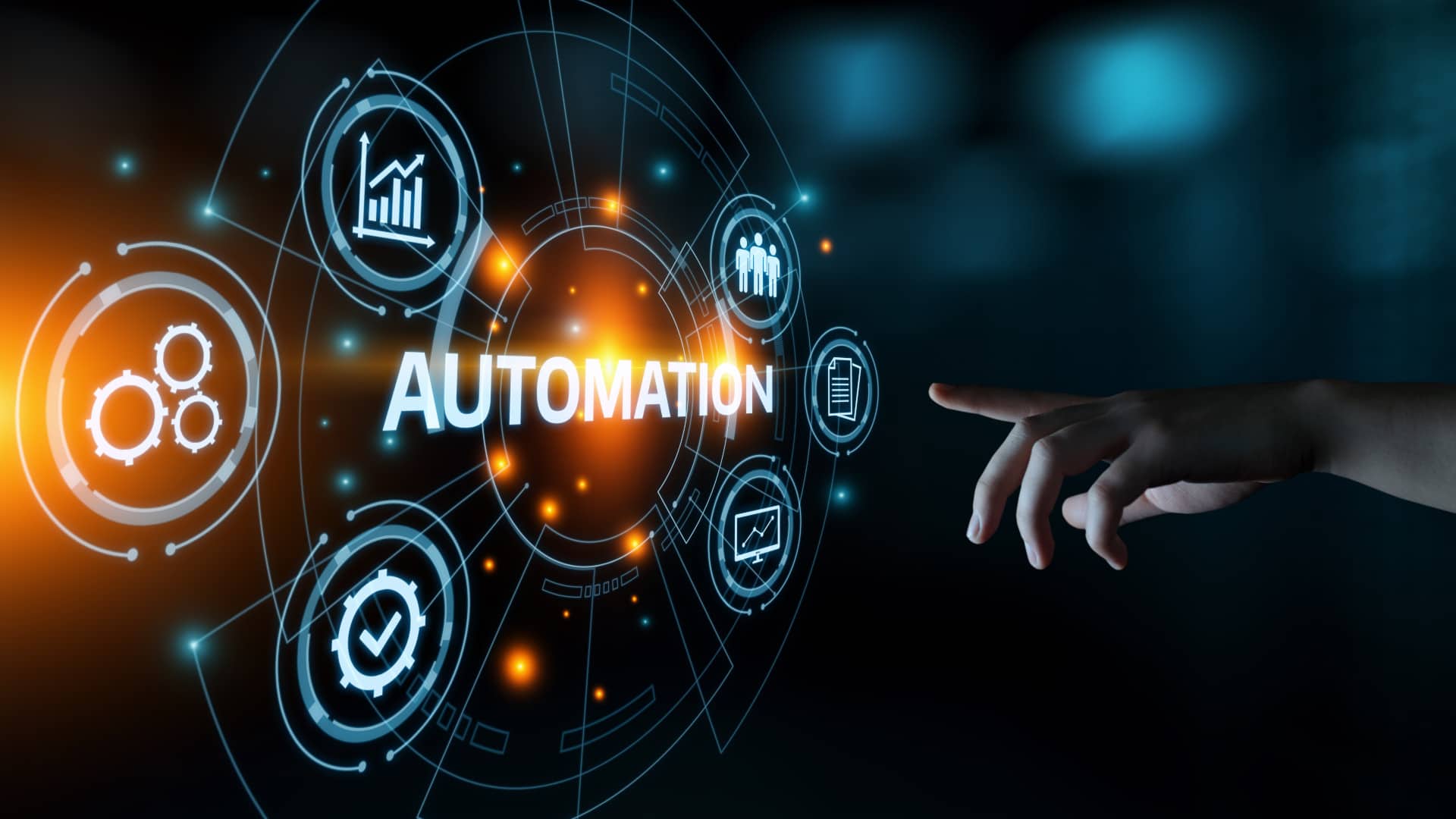
The Future Of Digital Marketing: AI And Automation
The integration of AI into the digital realm is ushering in a new era for businesses. No longer just a tool, AI is becoming the backbone of forward-thinking marketing strategies. It offers unparalleled precision in targeting, understanding, and engaging with audiences in ways we’ve never seen before.
Whether it’s optimizing the sales funnel, enhancing email marketing campaigns with predictive analytics, or offering a personalized experience through AI-powered chatbots, the horizon of possibilities is expansive.
Key Thought:
The evolution of digital marketing is truly fascinating, moving from basic email campaigns to strategies powered by AI. This isn’t just a passing fad but a significant change in how we engage with customers. We’ve transitioned from hands-on tasks and rule-driven automation to smart systems that identify patterns within data, letting us make quicker, more precise decisions for personalized experiences. The advent of AI goes beyond simply saving time.
Additional Resources and Further Reading
If you’re eager to explore more about AI in marketing automation, let’s get your hands on some valuable resources. These resources can offer a greater insight into the subject.
- The article The Role Of Artificial Intelligence In Digital Marketing provides an excellent overview of how AI is shaping the digital marketing landscape. It discusses key concepts such as predictive analytics and customer segmentation.
- To better understand why businesses are turning towards AI for their marketing needs, check out this insightful report by Forbes titled Artificial Intelligence: How Marketers Can Use AI To Make Their Jobs Easier. This resource does a fantastic job of explaining how companies can leverage artificial intelligence to improve their efficiency and results.
- If chatbots pique your interest, then you’ll enjoy reading Gartner’s research paper – Chatbots Will Appeal to Modern Workers.
- For those who want to dig deep into data privacy issues associated with implementing AI in digital campaigns, take a look at Cameron Kerry’s comprehensive guide titled Protecting Privacy in an AI-Driven World.
- Want to stay ahead of the curve? Deloitte’s article, Cognitive Technologies: The Real Opportunities for Business, offers a glimpse into future trends in AI and marketing automation.
Conclusion
The transformative power of artificial intelligence in marketing automation is undeniable. As we’ve explored throughout this article, AI is not just a fleeting trend but a foundational shift in how businesses engage with their customers. From predictive analytics to chatbots, AI tools are reshaping the marketing landscape, offering unprecedented personalization, efficiency, and insight. Do keep in mind, that even though AI can create a high-performance “Formula One” vehicle, it still does require human oversight to drive the car.
Brands like Nike, Netflix, Sephora, and Coca-Cola have already harnessed the potential of AI, setting a benchmark for others to follow. But as with any technology, it’s essential to approach AI with a balance of enthusiasm and caution, ensuring that data privacy and ethical considerations are always at the forefront.
For marketers and businesses alike, the key is to stay informed, continuously adapt, and be willing to innovate. The resources provided above offer a deeper dive into the world of AI in marketing, but the journey of discovery is endless. As AI continues to evolve in the coming years, so too will the opportunities it presents. Think of what it can do for every sector of business, finance AI solutions, healthcare AI solutions, the education sector, etc.
The future of marketing is AI-driven, and those ready to embrace it will undoubtedly reap the rewards.
FAQs
How is AI used in marketing automation?
AI supercharges marketing automation by analyzing customer data, predicting trends, and tailoring content. It’s a game-changer for efficiency and personalization. When you implement AI you create personalized content tailored to that specific consumer.
Will marketing be automated by AI?
Absolutely. Marketing is already getting automated with AI, enhancing precision targeting and engagement strategies while reducing advertising spend and manual tasks.
How would you use AI in marketing?
To use AI in marketing, leverage it for predictive analytics, content creation, lead generation, client management, image and video creation, personalized shopping, service agents, handle customer inquiries, influencer marketing, precise segmentation, targeted campaigns, or automating customer service through chatbots.
How is AI used in marketing analytics?
In marketing analytics, AI digs into large datasets to spot patterns or predict outcomes that human marketers might miss. It’s like having a crystal ball for your campaign performance.

